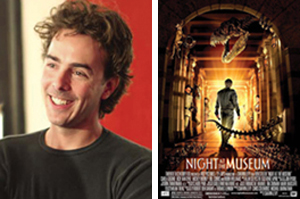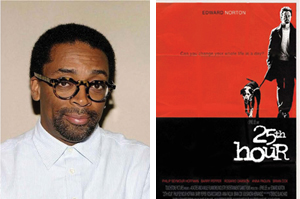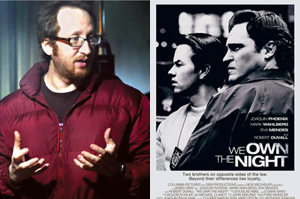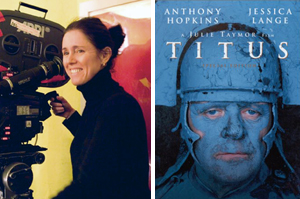BY DANIEL FRANKEL



 THE PITCH: Marketing departments don't always agree with
THE PITCH: Marketing departments don't always agree with
directors (top to bottom) James Gray, Julie Taymor, Spike
Lee and Shawn Levy can attest. (Credits: Columbia;
Everett; Abbot Genser; ESPN; Fox)
Of all the things that are haggled and squabbled over between director and studio during the production of a movie, it's the process that comes after the film is made that is perhaps the most contentious. According to Universal Pictures' Adam Fogelson, who headed his company's marketing unit before being promoted to the chairmanship last fall, marketing is a process that puts filmmaker and studio at odds for many movies that are released.
"About 25 percent of the time, there's a difference of opinion in terms of how a movie is going to be sold," Fogelson says. "It could be anything. Creative is always a hot-button topic. The media buy is another: If your ads are not on the TV programs the filmmaker watches, they may get the sense that no one is seeing them. Often, there's a difference of opinion as to who the target market is. And it's understandable that it's contentious. It's the part of the process where the filmmaker loses most of the control. That can be scary under the best of circumstances."
Indeed, according to Fogelson, only an elite handful of filmmakers— the "supreme tippy-top"— get the opportunity to drive the marketing campaigns on their films.
"There's no contractual agreement that can mandate collaboration," adds Shawn Levy, who directed the two highly successful Night at the Museum films. "Rarely will a studio throw out a campaign just because a director doesn't feel right about it."
That said, Levy probably embraces the film marketing process as much as any director. And while the director seldom leads the marketing process, Levy believes he or she can have a great deal of influence.
"More and more filmmakers are beginning to understand how the marketing process works and are using it to their benefit," he says. "And more and more filmmakers understand that all the work we do is for naught if people don't show up. You have to embrace the process and work within it. You can stamp your feet about the way things work, but at the end of the day, years of your life are worth shit if the audience doesn't show up."
Fogelson agrees. He believes directors who can deal with the fact that they're not directly in charge can still exert significant influence over marketing. "We try to engage filmmakers on a very meaningful level," he says. "There's an immense benefit in listening to the filmmaker."
For both Night at the Museum: Battle of the Smithsonian and his upcoming comedy Date Night, Levy developed teaser concepts for one-sheets and trailers before the movies were even shot.
"Getting involved with how your movie is positioned and sold is a process that starts really early," he says. Having overseen a Night at the Museum franchise that's grossed nearly $1 billion in combined worldwide box office, Levy thinks he's earned the luxury of creative trust from Fox officials.
"Part of it is that I've done over half a dozen movies with this studio and the executives give me an exorbitant amount of access to the marketing process," he says. "There's a comfort and a trust that comes from repeat business. If I made unsuccessful movies, I'm not sure they'd listen to me."
Of course, not every director feels listened to.
Director James Gray, whose credits include the 2007 Sony-distributed crime thriller We Own the Night, agrees with the latter sentiment, noting, "The problem is, you have almost no say-so. You can have all the ironclad agreements you want going in. I had final cut on my last film, but when it comes to marketing, you're all alone. It's the part of the process that directors have no control over. Consultation approval is about the best you can get."
"Marketing is the bane of the director's existence," quips Julie Taymor. In 1999, Fox Searchlight acquired her Shakespearean fantasy drama Titus, just before Lindsay Law stepped down as president of the studio's specialty division. "We no longer had anyone rooting for our film," Taymor recalls. Subsequently, in distribution, Fox Searchlight never committed to a release beyond 35 theaters, and the film lapsed into obscurity.
Another problem with studio marketing, filmmakers say, is timing. The production process is grueling enough . And at the end, there's rarely time and energy left over to do battle with a studio marketing department that may not share their vision.
"With the studios, you're dealing with a great variety of experts," explains one high-profile director who requested anonymity. "Some are smart, and some are destructive. Along the way, if they're not any good for you, there's always a second chance—you can work around them. Say you get a bad development executive. You can beat them down, or do whatever it is you have to do. You can lose an actor along the way—you can cut around them. But if you get a bad marketing executive, you're at the end of the train. You're screwed. The studios are not in the business of turning the big aircraft carrier around the moment they realize they're off-course. By then, it's too late, they're onto another picture."
Promotional spending is a key source of consternation for directors. Spike Lee recalls that for his 2002 film 25th Hour starring Edward Norton, co-producer/distributor Touchstone Pictures based its marketing campaign on prospective Golden Globes and Oscar consideration. Lee went along with that plan until the awards nominations didn't come through. But by then, it was too late. Touchstone opted against spending the substantial prints and advertising money needed to release the low-budget film widely.
So despite solid reviews from critics, the $5 million film was released in no more than 495 theaters at once, and grossed only $13 million domestically. "All we wanted was a fighting chance at the box office," Lee says. "I'm not saying throw money around like crazy, but the studio left that film to die."
Indeed, directors of indie films in particular often find that marketing for awards is inextricably linked to marketing for box office, further compounding the complexity of the process—and their frustration if it doesn't happen. "The sad thing about awards is, you don't get them if you're good, you get them if your company goes out and rallies for them," says Taymor.
Still, the leading marketing gripe among directors seems to be their lack of input on the creative elements used to market films. Many claim the trailers and one-sheets often don't resemble their actual movie in tone.
Gray, for example, notes that Sony's teaser copy for the commercially unsuccessful We Own the Night—'Two brothers on opposite sides of the law'—wasn't what the movie was about. It reduced the film to its basic genre parts.
"Sony came up with a gorgeous poster, but the copy was misleading," Gray adds. "That's often the central issue—how exploitive do we get and to what degree do we represent—or misrepresent—what the movie is."
Fogelson, whose studio releases 15-20 films a year, concedes that can be true. "As much as we attempt to dive into each and every film, we can't be as intimate with each of them as the filmmakers are."
Meanwhile, there exists a very basic fact: What makes a good movie ad isn't necessarily what makes a good movie.
"Marketing teams have the luxury of viewing every frame not only for what its intention was, but for how it can be used for promoting a movie, and those things can be at cross-purposes," Fogelson adds.
It's not that filmmakers don't understand that. "They're trying to sell the movie to as many people as they can, that's their job," Gray agrees. "And you're trying to get the campaign to look like it's some beautiful old movie poster on your living room wall, which can be kind of immature, because that sort of advertising doesn't exist anymore. Those aren't exactly the same goals."
While some directors urge their peers to "fight" aggressively so that their creative vision is reflected in the marketing collateral, Levy urges a collaborative, pro-active approach. "You win a lot more when you broach the subject [to studio marketing execs] respectfully and in the spirit of partnership," he says.
Taymor agrees: "I don't think any film company wants the director not to feel happy about what they're doing. They need you to do the hustle and talk to the They really need you to promote that movie."
Of course, even a diplomat like Levy sees the limitations of the carrot—and potential of the stick. "It's a card you only want to play occasionally," he says, "but sometimes it's effective to throw a good old-fashioned filmmaker hissy fit."